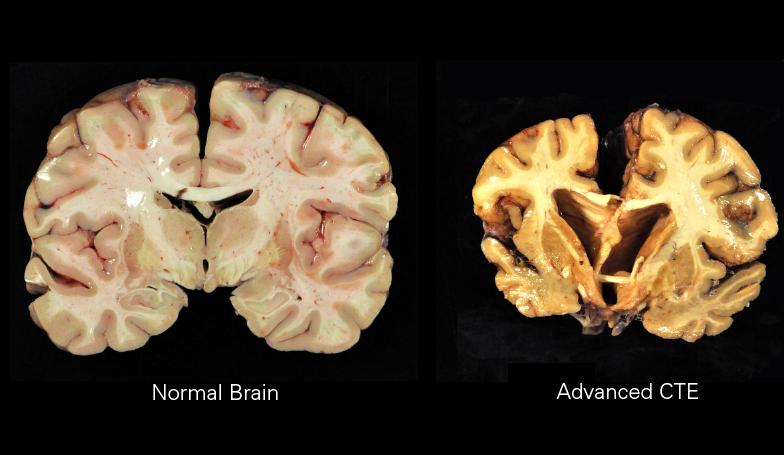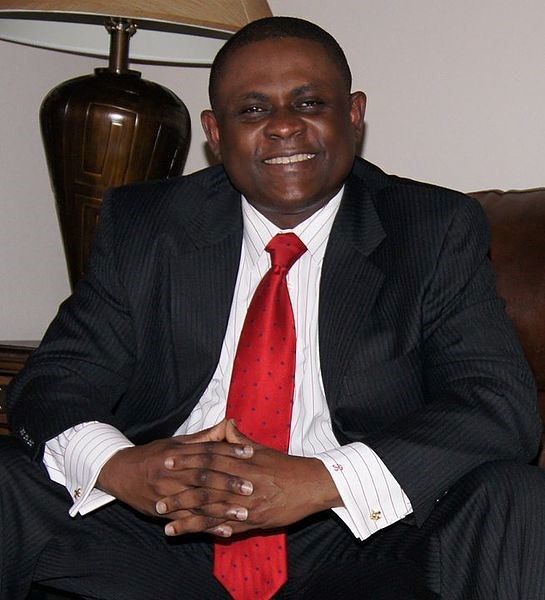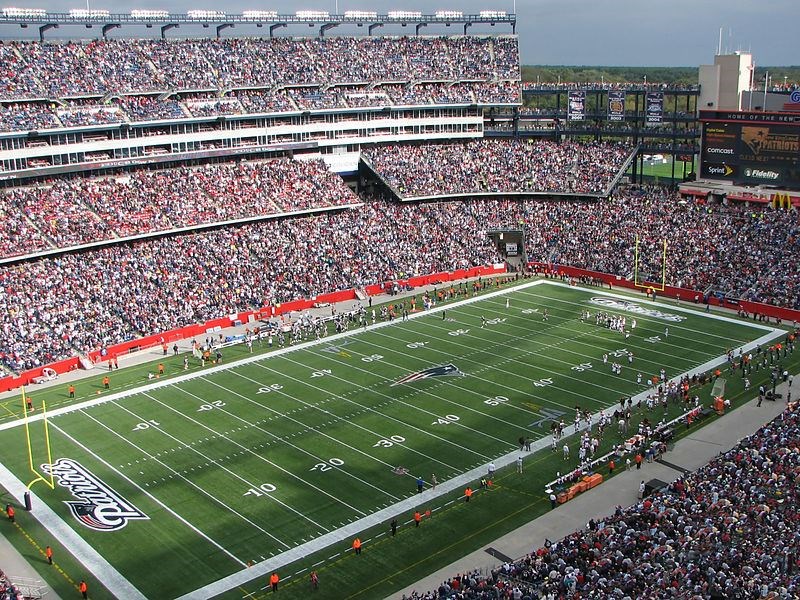We own this field. We are not going to bow to some no-name Nigerian with some bulls*** theory.
-Jeanne Marie Laskas referencing the NFL's position
 Chronic Traumatic Encephalopathy (CTE)Boston University Center for the Study of Traumatic Encephalopathy [CC BY-SA 4.0 (https://creativecommons.org/licenses/by-sa/4.0)] Bang! Helmets collide, the eerie sound of plastic on plastic echoing through the stadium. Both victims of the blow foggily regain consciousness as they rush back to their teams, the crowd erupting with enthusiasm and excitement as the game continues. Professional football players experience thousands of these blows to the head throughout their career, guaranteeing them permanent brain damage (Seifert). While this damage is a well-known consequence of playing football, no one had yet realized that the frequent concussions would cause retired players to experience insomnia, insanity, and eventually an early and often suicidal death. That is, until Mike Webster of the Pittsburgh Steelers ended up on Bennet Omalu’s autopsy table. Eight years prior to this critical moment, Omalu left his parents and six siblings in Nnokwa, Nigeria, eager to immigrate to America to finish his medical education (“Bennet Omalu” and Seifert). After much hard work, Omalu would become a pathologist in Pittsburgh and discover a buildup of proteins in the brain of Mike Webster. He named this disease, caused by participation in football and other contact sports, chronic traumatic encephalopathy, or CTE (Laskas). Little did Omalu know that his findings would spark a fierce and merciless battle against one of America’s favorite corporations: the National Football League. Omalu’s initial release of research papers detailing CTE received immediate backlash by the NFL, who discredited Omalu in an attempt to thwart his efforts to inform the public (Laskas). However, Omalu was unphased, continuing to collect additional brains and data until his results became the undeniable truth. Despite the National Football League’s public campaign against him, Bennet Omalu maintained his willingness to fight for the safety of others and his drive to unravel the truth entangled in the NFL’s web of deceit, earning himself the well-deserved title of a hero.
Chronic Traumatic Encephalopathy (CTE)Boston University Center for the Study of Traumatic Encephalopathy [CC BY-SA 4.0 (https://creativecommons.org/licenses/by-sa/4.0)] Bang! Helmets collide, the eerie sound of plastic on plastic echoing through the stadium. Both victims of the blow foggily regain consciousness as they rush back to their teams, the crowd erupting with enthusiasm and excitement as the game continues. Professional football players experience thousands of these blows to the head throughout their career, guaranteeing them permanent brain damage (Seifert). While this damage is a well-known consequence of playing football, no one had yet realized that the frequent concussions would cause retired players to experience insomnia, insanity, and eventually an early and often suicidal death. That is, until Mike Webster of the Pittsburgh Steelers ended up on Bennet Omalu’s autopsy table. Eight years prior to this critical moment, Omalu left his parents and six siblings in Nnokwa, Nigeria, eager to immigrate to America to finish his medical education (“Bennet Omalu” and Seifert). After much hard work, Omalu would become a pathologist in Pittsburgh and discover a buildup of proteins in the brain of Mike Webster. He named this disease, caused by participation in football and other contact sports, chronic traumatic encephalopathy, or CTE (Laskas). Little did Omalu know that his findings would spark a fierce and merciless battle against one of America’s favorite corporations: the National Football League. Omalu’s initial release of research papers detailing CTE received immediate backlash by the NFL, who discredited Omalu in an attempt to thwart his efforts to inform the public (Laskas). However, Omalu was unphased, continuing to collect additional brains and data until his results became the undeniable truth. Despite the National Football League’s public campaign against him, Bennet Omalu maintained his willingness to fight for the safety of others and his drive to unravel the truth entangled in the NFL’s web of deceit, earning himself the well-deserved title of a hero.
 Dr. Bennet OmaluWilkinrm1 [CC BY-SA 4.0 (https://creativecommons.org/licenses/by-sa/4.0)] Rather than reveling in his own newly discovered fame, Omalu redirected the attention towards critical issues in need of recognition. While Omalu could have easily used his stardom to spotlight and expose the NFL’s lies, he remained focused on what he found most important: the health of society: “Omalu did not target the NFL, either in his book or [in an] interview, and appealed instead to parents to advocate better for the health of football players” (Seifert). Omalu considered his own personal issues and controversial discoveries inferior to the well-being of society and America’s next generation. While he had the opportunity, given his fame, to make money pioneering new ways to diagnose and treat CTE, Omalu continued to focus on others. Since fame was not what Omalu strived for, he was unphased by its pitfalls and knew he must keep moving forward to guard others from the brutal effects of CTE on the brain. While his fame allowed him to give a voice to the unspoken suffering caused by CTE, it came at a price: “Omalu got a visit from a sports reporter who had come for some quotes, who saw Webster’s and Long’s brains sitting in tubs in the living room and had said, ‘Get these out of your house! Someone could come in and kill you and steal these brains! Do you know what you’re dealing with?’” (Laskas). It appeared the NFL would stop at nothing to maintain their good image and their powerful hold on America; this meant Omalu would live in constant fear for his own safety and that of his research. While these unspoken threats haunted Omalu, he did not run away to a secret shelter in some foreign country; he stayed where he was, continuing to work on brains and ignore the potential danger he faced. Even though Omalu was the “new craze” in the world of America’s news, he still did not focus on his personal troubles with the NFL, instead bringing light to the problems of the masses. This unrequited focus on the well-being of society and reluctance to focus on himself, even in possible life-threatening situations, reveals Omalu’s truly altruistic personality.
Dr. Bennet OmaluWilkinrm1 [CC BY-SA 4.0 (https://creativecommons.org/licenses/by-sa/4.0)] Rather than reveling in his own newly discovered fame, Omalu redirected the attention towards critical issues in need of recognition. While Omalu could have easily used his stardom to spotlight and expose the NFL’s lies, he remained focused on what he found most important: the health of society: “Omalu did not target the NFL, either in his book or [in an] interview, and appealed instead to parents to advocate better for the health of football players” (Seifert). Omalu considered his own personal issues and controversial discoveries inferior to the well-being of society and America’s next generation. While he had the opportunity, given his fame, to make money pioneering new ways to diagnose and treat CTE, Omalu continued to focus on others. Since fame was not what Omalu strived for, he was unphased by its pitfalls and knew he must keep moving forward to guard others from the brutal effects of CTE on the brain. While his fame allowed him to give a voice to the unspoken suffering caused by CTE, it came at a price: “Omalu got a visit from a sports reporter who had come for some quotes, who saw Webster’s and Long’s brains sitting in tubs in the living room and had said, ‘Get these out of your house! Someone could come in and kill you and steal these brains! Do you know what you’re dealing with?’” (Laskas). It appeared the NFL would stop at nothing to maintain their good image and their powerful hold on America; this meant Omalu would live in constant fear for his own safety and that of his research. While these unspoken threats haunted Omalu, he did not run away to a secret shelter in some foreign country; he stayed where he was, continuing to work on brains and ignore the potential danger he faced. Even though Omalu was the “new craze” in the world of America’s news, he still did not focus on his personal troubles with the NFL, instead bringing light to the problems of the masses. This unrequited focus on the well-being of society and reluctance to focus on himself, even in possible life-threatening situations, reveals Omalu’s truly altruistic personality.
Omalu’s perseverance in the face of daunting obstacles reveals his dedication to unmasking the truth. The NFL is a rich and powerful corporation, with faithful fans across America; anyone would be tempted to back down when opposing this enterprise. While it would be reasonable for the ordinary person to give up, Bennet Omalu remained dedicated to his work, saying, “‘If you learn from my story, what made me successful is that I refused to conform to the definition and expectations other people had of me,’” (qtd. in “Dr. Bennet Omalu Spotlights”). Omalu continued to dedicate his life to studying brains, even when less was expected of him. Omalu knew the potential of the data he was collecting and how it could prevent hundreds, if not thousands of lives from an early ending. He was willing to endure anything in order to warn and educate the public regarding CTE. Omalu maintained this mindset throughout his exploration of the disease, even when his research was unjustly accused of being inaccurate and erroneous: “‘When the NFL and other doctors in America denied my work, I kept the faith that what I was doing was for the good of all of us and that we together would prevail,’ [Omalu] says” (“Dr. Bennet Omalu Spotlights”). Omalu dedicated himself to informing and protecting the public, and stopped at nothing to achieve these ambitions, even when it meant he would be risking his reputation as a pathologist. Omalu trusted the integrity of his work, despite it being refuted by partisan doctors who received their paychecks from the NFL (Laskas). In spite of these obstacles, Omalu knew what he was doing was right, and remained dedicated to his research and the well-being of society through and through.
 NFL StadiumBernard Gagnon [CC BY-SA 3.0 (https://creativecommons.org/licenses/by-sa/3.0)] Omalu’s selfless dedication to the well-being of others and ability to maintain focus on a greater cause have made him an inspiration to all. Omalu was intent on spreading truth to free the masses from the lies the NFL spread to protect its industry. We must look at heroes such as Omalu to perceive what we can accomplish when we stay true to our goals and refuse to back down. When asked if he believed society would accept his findings, Omalu responded, “‘...the truth will always prevail. It may take a long time. It may not happen in my lifetime. But there are no alternative facts. There are just facts. And, in the end, the truth wins every time’” (qtd. in “Is Youth Football”). While Omalu understood that the human race takes times to adjust to change, he had unwavering certainty that Americans, in time, would come to accept the reality of football-induced brain damage in America and work to protect one another. His admirable confidence in humanity makes him an inspiration to all; he sees the benevolence within society and is content knowing that his arduous work will help anyone, even absolute strangers, in the future. I believe Bennet Omalu is a deserving hero because he represents the best of humankind. While Omalu does not fit the mold of the typical hero seen in comics and movies, he is still able to connect with the world and show compassion towards those around him. Omalu made a powerful push in the right direction, especially as Americans continue to see news channels bursting with accounts of discrimination involving immigration into America. Omalu inspires me to become a better version of myself and to focus on and aid those around me, even if it means I must sacrifice something of my own. So on a Sunday this fall, when all of America hears the banging clash of helmets from the comfort of their couches, hopefully Omalu’s story spurs us all to appreciate the sacrifices this immigrant made to protect America.
NFL StadiumBernard Gagnon [CC BY-SA 3.0 (https://creativecommons.org/licenses/by-sa/3.0)] Omalu’s selfless dedication to the well-being of others and ability to maintain focus on a greater cause have made him an inspiration to all. Omalu was intent on spreading truth to free the masses from the lies the NFL spread to protect its industry. We must look at heroes such as Omalu to perceive what we can accomplish when we stay true to our goals and refuse to back down. When asked if he believed society would accept his findings, Omalu responded, “‘...the truth will always prevail. It may take a long time. It may not happen in my lifetime. But there are no alternative facts. There are just facts. And, in the end, the truth wins every time’” (qtd. in “Is Youth Football”). While Omalu understood that the human race takes times to adjust to change, he had unwavering certainty that Americans, in time, would come to accept the reality of football-induced brain damage in America and work to protect one another. His admirable confidence in humanity makes him an inspiration to all; he sees the benevolence within society and is content knowing that his arduous work will help anyone, even absolute strangers, in the future. I believe Bennet Omalu is a deserving hero because he represents the best of humankind. While Omalu does not fit the mold of the typical hero seen in comics and movies, he is still able to connect with the world and show compassion towards those around him. Omalu made a powerful push in the right direction, especially as Americans continue to see news channels bursting with accounts of discrimination involving immigration into America. Omalu inspires me to become a better version of myself and to focus on and aid those around me, even if it means I must sacrifice something of my own. So on a Sunday this fall, when all of America hears the banging clash of helmets from the comfort of their couches, hopefully Omalu’s story spurs us all to appreciate the sacrifices this immigrant made to protect America.
Works Cited
"Bennet Omalu." Contemporary Black Biography, vol. 132, Gale, 2016. Biography In Context, https://link.galegroup.com/apps/doc/K1606007567/BIC?u=powa9245&sid=BIC&xid=65870ca2. Accessed 21 Mar. 2019.
“Dr. Bennet Omalu Spotlights a Profoundly Inconvenient Truth.” Dr. Bennet Omalu Spotlights a Profoundly Inconvenient Truth | Department of Epidemiology, 28 Sept. 2017, epi.washington.edu/news/dr-bennet-omalu-spotlights-profoundly-inconvenient-truth.
“Is Youth Football Child Abuse?” Fatherly, 3 Feb. 2019, www.fatherly.com/play/dr-bennet-omalu-youth-football-child-abuse/.
Laskas, Jeanne Marie. “Game Brain: Football Players and Concussions.” GQ, GQ, 26 May 2017, www.gq.com/story/nfl-players-brain-dementia-study-memory-concussions.
Seifert, Kevin. “Dr. Bennet Omalu: CTE Obsession Obscuring Truth about Brain Health of Football Players.” ESPN, ESPN Internet Ventures, 4 Aug. 2017, www.espn.com/nfl/story/_/id/20245394/dr-bennet-omalu-says-obsession-cte-obscuring-larger-truth-brain-health-football-players.
Page created on 4/8/2019 7:22:48 PM
Last edited 9/17/2019 10:29:52 PM
commons.wikimedia.org
